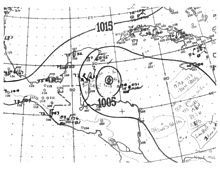|name=. Remove this parameter; the article title is used as the name by default. Surface analysis map of the hurricane on November 8 | |
| Meteorological history | |
|---|---|
| Formed | November 5, 1942 |
| Dissipated | November 11, 1942 |
| Category 2 hurricane | |
| 1-minute sustained (SSHWS/NWS) | |
| Highest winds | 110 mph (175 km/h) |
| Lowest pressure | 991 mbar (hPa); 29.26 inHg |
| Overall effects | |
| Fatalities | 9 |
| Damage | $4 million (1942 USD) |
| Areas affected | Bahamas, Belize, Cuba |
| IBTrACS | |
Part of the 1942 Atlantic hurricane season | |
The 1942 Belize hurricane was one of only two known hurricanes to strike Belize in the month of November, alongside Hurricane Lisa in 2022. The thirteenth observed tropical cyclone, eleventh tropical storm, and fourth hurricane of the 1942 Atlantic hurricane season, this storm was detected in the vicinity of Turks and Caicos Islands on November 5. Initially a tropical storm, it strengthened slowly while moving westward and then south-southwestward across the Bahamas. On November 6, the storm became a Category 1 hurricane on the modern day Saffir–Simpson hurricane wind scale. Later that day, it made landfall in Cayo Romano, Camagüey Province, Cuba. Impact in Cuba and the Bahamas was limited to lower barometric pressure readings and strong winds. While crossing Cuba, the system weakened to a tropical storm early on November 7, shortly before emerging into the Caribbean Sea. The storm re-strengthened into a hurricane later that day and headed southwestward.
Late on November 8, this system curved westward and intensified into a Category 2 hurricane. Six hours later, it peaked with winds of 110 mph (175 km/h). Early on November 9, the storm struck Caye Caulker and northern Belize District. Rapidly weakening, the system fell to tropical storm status within 12 hours of landfall. By early on November 10, it emerged into the Bay of Campeche. The storm meandered erratically until striking the Yucatán Peninsula on November 11 and dissipating hours later. Strong winds were observed in Belize and Mexico's Yucatan Peninsula. Severe damage was reported in the former. About 90% of structures in San Pedro Town were destroyed, while Newtown was obliterated, causing its residents to relocate and establish the village of Hopkins. Trees and crops such as coconuts also suffered heavy losses. Overall, nine deaths and approximately $4 million (1942 USD) in damage were reported.[nb 1]
Cite error: There are <ref group=nb> tags on this page, but the references will not show without a {{reflist|group=nb}} template (see the help page).